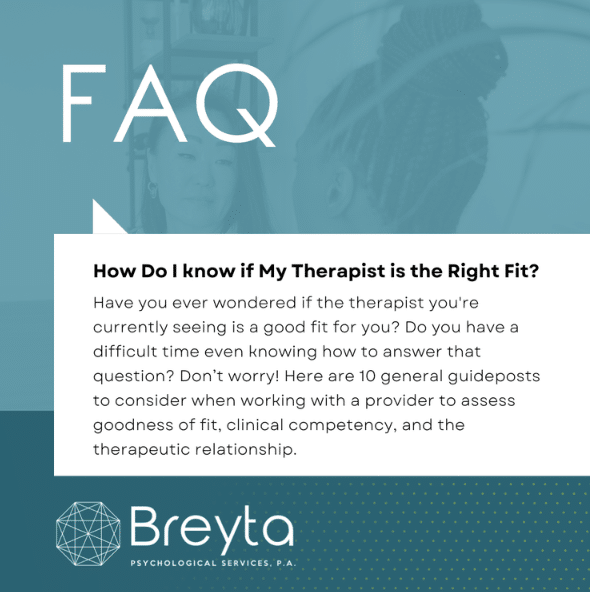This is one of the most frequently asked questions within the therapy world – and it should be! The connection between you and your therapist, or what is generally referred to as “fit” is one of the most important variables in determining the success of your journey in therapy. Fit, and the connection (or “alliance”) you have with your therapist, is even more important at times than the specific therapy your therapist uses, how many years of training they’ve had, or other variables we tend to get focused on when searching for a match.
Because this is such an important question, we’re going to provide you with heaps of useful information on how to find a great match for you and also how to ascertain if your current match is working for you. Read on for our excellent guide.
How Do I know if My Therapist is the Right Fit?
Have you ever wondered if the therapist you are currently seeing is a good fit for you? Do you have a difficult time even attempting to identify what to reflect on when considering this query? Don’t worry! Many of us have run into this same concern when participating in therapy as there is not necessarily a clear or definitive guide to navigating this very personal inquiry.
Here are 10 general guideposts to consider when working with a provider to assess goodness of fit, clinical competency, and the therapeutic relationship. Examining these prompts at numerous points during therapy will also aid in identifying and addressing any potential concerns you may be having with your therapist.
- They provide a tailored and individualized approach
- It is important that therapy be a collaborative process that involves developing therapeutic goals openly with the client (usually during the intake session with intermittent check-ins about progress/changes toward goals as therapy continues), and on-going conversations about the therapeutic process in general. Additionally, therapy is not a “one size fits all” approach. Treatment modalities, strategies, and techniques are most efficacious when individually tailored to the specific needs of the client. It is important that the client is willing and open to trying new things, however, if a particular intervention isn’t working, the therapist should be able to provide other interventions and suggestions.
- You feel comfortable, heard, and respected
- The therapy space should provide a judgement-free environment where the client feels comfortable to openly express what they feel and think without shame or criticism. Therapy is the most effective when the client can be completely transparent and honest about what they have experienced and/or are currently experiencing.
- Your boundaries are respected
- Within the therapy experience, clients should feel a sense of autonomy and agency. Clinicians may offer resources, recommendations, and walk alongside the client as they navigate challenges. However; the client is ultimately in control of their own decision-making and choices that the therapist should respect.
- You feel a sense of interpersonal connection with your therapist
- Current literature indicates that the therapeutic alliance (or the relationship between client and therapist) is as vital, if not more so, to positive outcomes in therapy as using the correct treatment method.
- You are making progress and your goals for therapy are made a priority
- As much as we would like it to be, progress in therapy is not always linear or an overnight solution. Meaningful change takes time. With that being said, observing and identifying the positive effects and improvements from therapy should be evaluated and discussed with the therapist periodically over the course of treatment to make needed adjustments and provide feedback, focus on specific goals more intensely, and inspire a sense of value and confidence in the therapeutic work and personal growth that is occurring.
- Your therapist is working within their area of expertise
- Therapists are held to an ethical standard that they are practicing within the scope of their competency and expertise. The majority of clinicians have significant experience and training in numerous clinical areas, treatment interventions, and populations. When searching for a provider, clients should ensure that the therapist has specific training and experience concerning the issue they are seeking treatment for. Therapists should be open and transparent in discussing their areas of expertise with prospective clients as well as any areas that are not within their scope of practice.
- Their availability aligns with what works best for your schedule
- Some psychological concerns require more intensive treatment than others. It is important that therapists are able to provide availability that meets the needs of the client before committing to treatment, such as the ability to schedule more than one therapy session per week. Additionally, therapists often have varying hours that they are available. For instance, some therapists work later hours to accommodate for clients that need availability after work, while others may work on the weekends. It is best for the client to determine their preferred availability to participate in therapy and ensure the therapist’s schedule aligns with their specific needs.
- Tools, strategies, techniques, and resources to utilize outside of the session are discussed
- Therapeutic work happens both inside and outside of the therapy session. Therapists should provide resources and other tools for clients (again tailored and individualized) to use and work on to enhance and reinforce the work that occurs within the therapy session.
- You consider your therapist trustworthy and approachable
- Trust is also a vital component of the therapeutic alliance and arguably THE most important aspect of building a strong bond between the therapist and the client. One way trust can be fostered over time involves the therapist seeking to genuinely understand the client’s concerns and point of view through active listening, being present and focused during the session, and asking thoughtful questions. Additionally, the therapist expressing empathy and validation toward the client’s thoughts, emotions, and experiences, as well as building confidence and faith within the client that they are able to help are also signs trust-building.
- They ask for feedback
- Therapists initiating receiving feedback from their clients to assess how the overall therapeutic experience is going is integral in providing successful therapy outcomes and continuing to foster the therapeutic alliance. Periodic “check-ins” can be helpful in evaluating therapy goals, interventions, and treatment planning to adapt to the client’s unique needs throughout the therapeutic process and reinforce collaboration, open communication, and rapport.
We have many doctoral-level psychologists on our team in Raleigh, NC who are ready to chat with you about what’s on your mind. If you’re interested in a free 15 minute consultation, contact us today and we’ll match you with a therapist who is an excellent fit for your goals and needs.





